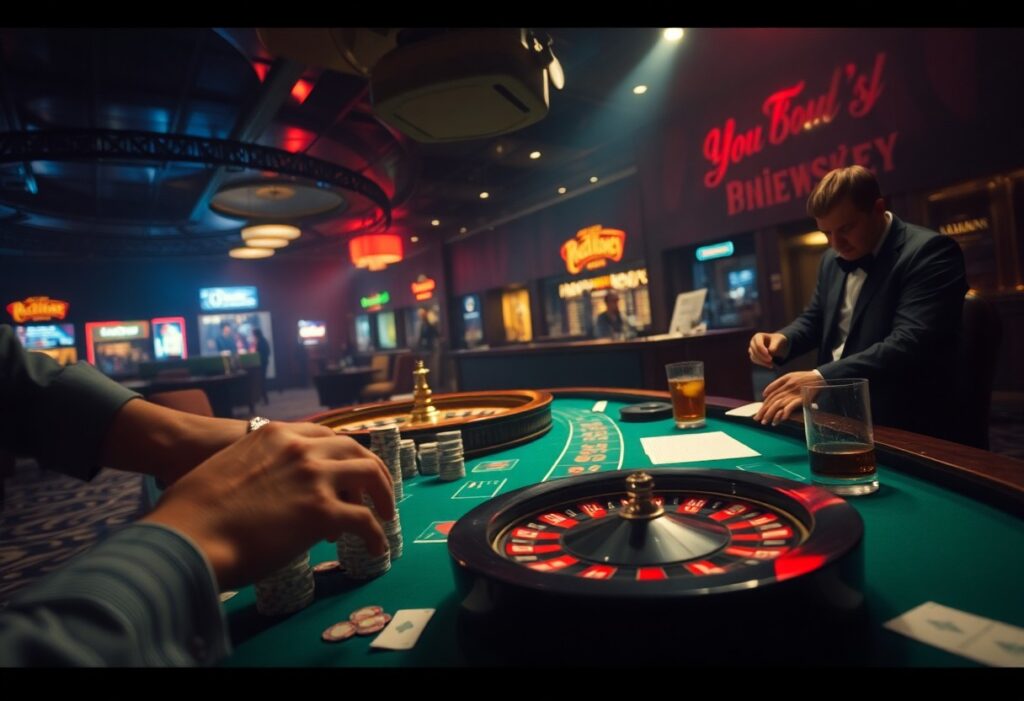
There’s a significant difference between playing poker online and at a casino. Transitioning to the live poker experience can be both exciting and challenging, as you’ll need to adapt to the social dynamics and tactile environment of a casino floor. This guide will equip you with necessary tips to enhance your live poker skills, ensure proper bankroll management, and navigate the intricacies of live gameplay, helping you achieve a successful and enjoyable transition from the online world to the exhilarating atmosphere of live poker.
Types of Poker Games Available at Casinos
When stepping into a casino, players encounter a variety of poker games, each offering unique strategies and experiences. The most popular types include:
- No-Limit Texas Hold’em
- Pot-Limit Omaha
- Seven-Card Stud
- Mixed Games
- Casino Poker Variants
The range of poker games caters to different skill levels and preferences.
| No-Limit Texas Hold’em | Most popular game with big pots. |
| Pot-Limit Omaha | Four hole cards; requires strong hand evaluation. |
| Seven-Card Stud | Focuses on reading opponents with no community cards. |
| Mixed Games | Combination of different poker variants. |
| Casino Poker Variants | Unique games offered by specific casinos. |
Cash Games
Cash games allow players to buy in for real money and play at their own pace, with chips directly representing cash. Players can join or leave the table whenever they like, making each session adaptable and less stressful than tournament play. A key feature is the ability to adjust stakes, appealing to both high-rollers and casual players alike.
Tournaments
Tournaments offer a competitive atmosphere, with players competing for a prize pool based on entry fees. Participants start with a set amount of chips, and blinds increase at regular intervals, creating an exciting dynamic. The structure encourages strategic play as participants must balance aggression with chip preservation to progress through the stages.
Events can range from small daily tournaments to large-scale championships with thousands of entrants and substantial payouts. Players often encounter different formats, such as freezeouts or rebuys, influencing their approach and strategy. The social aspect is amplified as players interact, fostering camaraderie and rivalry. Understanding tournament structures and dynamics is vital for success and enjoyment.
Tips for a Smooth Transition from Online to Live Poker
- Familiarize yourself with game variations before stepping in.
- Practice hand reading to enhance your live play.
- Become aware of table dynamics to adjust your strategy.
- Stay composed and be mindful of time management at the casino.
Thou should keep an open mind and focus on adapting to the unique environment.
Understanding Casino Etiquette
Mastering casino etiquette is imperative for a seamless transition. This includes acknowledging fellow players, waiting for your turn, and using appropriate gestures during gameplay. Familiarize yourself with common rules, such as the importance of not discussing hands in play and how to signal your bets. A proactive approach to etiquette ensures a positive experience for everyone at the table.
Managing Your Bankroll
Effective bankroll management can make or break your live poker experience. Set aside a specific amount for each session, ideally no more than 5% of your total poker funds. This limits your exposure to risk while allowing for extended play. Adapt your stakes according to your comfort level and avoid going on tilt if you face losses. Establishing strict limits helps preserve your bankroll for future games, enabling you to enjoy the experience without financial strain.
Managing your bankroll also includes tracking your wins and losses to refine your strategy over time. By identifying patterns in your play, you can determine the moving parts of your game that require enhancement. Keeping a detailed record not only informs your tactical decisions but also provides a clearer picture of your overall performance. Prioritize patience and discipline in managing your funds, reinforcing your confidence while engaging with live opponents.
Step-by-Step Guide to Preparing for Your First Live Game
| Choosing the Right Casino | Research local casinos to identify one that aligns with your gameplay style, budget, and comfort level. Look for venues with a good reputation and positive reviews, ensuring a welcoming environment for beginners. |
| Getting Familiar with the Game Setup | Understand the physical layout of the poker table, the dealer’s role, and the flow of the game. Observing live games beforehand can provide insights into betting procedures and etiquette. |
Choosing the Right Casino
Evaluate casinos based on stakes, player demographics, and ambiance. A smaller casino may offer a more relaxed setting, while larger ones could provide more action and variety. Prioritize venues with skilled dealers who maintain a friendly and efficient game flow.
Getting Familiar with the Game Setup
Learn how chips are handled, where to sit, and the function of the dealer button. Noticing how players interact allows you to grasp the dynamics of live interactions, which differ significantly from online play. Observing the ritual of blinds and antes will also prepare you for betting sequences.
In-depth familiarity with the game setup will enhance your confidence on the casino floor. Knowing where to place your bets, how to signal for a raise, and the distribution of cards can alleviate anxiety. Watching a few rounds of poker while taking mental notes on chip handling and the flow of action will greatly enhance your comfort level when it’s your turn to play.
Key Factors to Consider Before Playing Live
- Casino Environment: Look for a friendly atmosphere.
- Game Selection: Ensure your preferred games are offered.
- Player Experience: Consider your own comfort level with live players.
- Bankroll Management: Set a clear budget before arriving.
- Etiquette: Familiarize yourself with live poker etiquette.
Assume that these factors shape your overall experience, enhancing enjoyment and success at the tables.
Game Variations
Diving into live poker often means encountering various game variations that differ from online play. Familiarize yourself with popular options like Texas Hold’em, Omaha, and Seven-Card Stud. Each game has unique rules and strategies, so mastering these fundamentals can significantly improve your gameplay and decision-making. Observing how dealers manage the game and how chips are handled can also provide insights that online play overlooks.
Player Dynamics
The atmosphere at a live poker table can vary significantly based on player dynamics. In a live setting, players exhibit diverse behaviors that influence the game’s pace and strategy. Pay attention to how opponents react, whether they are calm, aggressive, or passive. Engaging players in conversation can help gauge their confidence and strategies, providing you with insights throughout the game. Being aware of table dynamics can act as an important advantage, helping you adjust your approach accordingly.
Understanding player dynamics deeply can transform your strategy. For instance, if you’re at a table with hyper-aggressive players, you might opt for a tighter playstyle, waiting for premium hands to capitalize on their mistakes. Observing non-verbal cues, like facial expressions or body language, can also help you assess when an opponent is bluffing or has a strong hand. By reading the table correctly, you can adapt your tactics, ultimately increasing your odds of success in the long run.
Pros and Cons of Playing Poker Live Compared to Online
| Pros | Cons |
|---|---|
| Social interaction with players. | Higher dealer tips and casino fees. |
| Physical tells and psychological gameplay. | Limited game availability and hours. |
| Immersive environment and atmosphere. | Longer wait times for hands to be dealt. |
| Opportunity for live tournaments. | Travel time and costs required. |
| More substantial player involvement. | Possibility of distractions and noise. |
Advantages of Live Poker
Live poker offers a unique atmosphere that enhances the overall experience; players benefit from the social component, allowing for face-to-face interaction. This engagement can lead to richer psychological gameplay, as players can read physical tells, which are absent in online environments. Additionally, the thrill of playing in a bustling casino adds excitement, and the chance to participate in live events can be rewarding and memorable.
Disadvantages of Live Poker
While live poker presents numerous advantages, it also entails drawbacks. Players face increased costs due to dealer tips and casino fees, and game availability is often limited compared to online options. The time spent waiting for hands to be dealt can be frustrating, and travel to and from casinos incurs additional expenses. Furthermore, the noisy and distracting environment can detract from focus, making it challenging for some players to maintain optimal performance.
Conclusion
Considering all points, transitioning from online to live poker requires adaptation to a new environment and social dynamics. Familiarizing yourself with live game etiquette, understanding chip handling, and practicing face-to-face interactions are crucial for a seamless shift. Observing seasoned players can provide valuable insights, while mastering the art of reading opponents will enhance your strategy. By embracing the differences and refining your skills, you can effectively bridge the gap between online play and the casino floor, leading to a more rewarding poker experience.
FAQ
Q: How can I adjust my playing style when transitioning from online poker to live poker?
A: Adjusting your playing style involves being more observant of your opponents’ physical tells, adjusting to the pace of live play, and optimizing your betting patterns to account for the differences in interaction. Focus on reading body language and reactions while considering that opponents may play differently in person.
Q: What should I know about the physical environment of a casino when switching to live poker?
A: The casino environment can be noisy and distracting, impacting concentration. Familiarize yourself with the layout, rules at the table, and etiquette. Being aware of dealer procedures and chip handling is important as it differs from online settings.
Q: How can I manage bankroll effectively while moving from online to live poker?
A: Set a budget for live play that reflects the cash available after accounting for expenses like travel and food. Avoid using your entire bankroll in one session; instead, play within your limits. Track your wins and losses meticulously to maintain a clear picture of your financial status in live settings.



